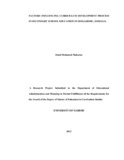| dc.description.abstract | This study sought to examine factors that influence curriculum development process in secondary education in Somalia. The objectives of the study were; to determine influences of societal needs, skills of experts, political forces, resources and Somali culture on curriculum development process. Descriptive survey was employed to design this study. Qualitative research paradigm was used in order to capture relevant information. The target population for this study was 2,472 respondents who comprised of curriculum experts and teachers from Banadir Region. Among this target population sample size was selected from curriculum experts (25) and teachers (80) using stratified random sampling technique. The study employed three research instruments; questionnaire, participant observation schedule and document analysis guide. Data were analysed using Statistical Package for Social Sciences (SPSS) computer programme to compute descriptive statistics such as percentages and frequencies. The results were presented in frequency tables. Findings of the study revealed that the majority of experts were not satisfied with curriculum development process at secondary school level because they lacked special training in curriculum development process. Teachers who participated in this study expressed lack of confidence in their abilities using the current curriculum and argued that this curriculum was not trialed out before it was implemented in the entire country. However, the study also revealed that policy objectives were well formulated and were based on cultural requirements of the society. It was concluded that curriculum experts were not professionally competent thus need for capacity building programmes for them to improve their skills and knowledge on curriculum expertise. It was further recommended that there is need to revise the curriculum and textbooks to improve the quality of curriculum in Somalia. There is need to harmonize the existing curricular in Somalia. Finally, the Ministry of Education should develop special training programmes for to curriculum trainers. | en_US |



